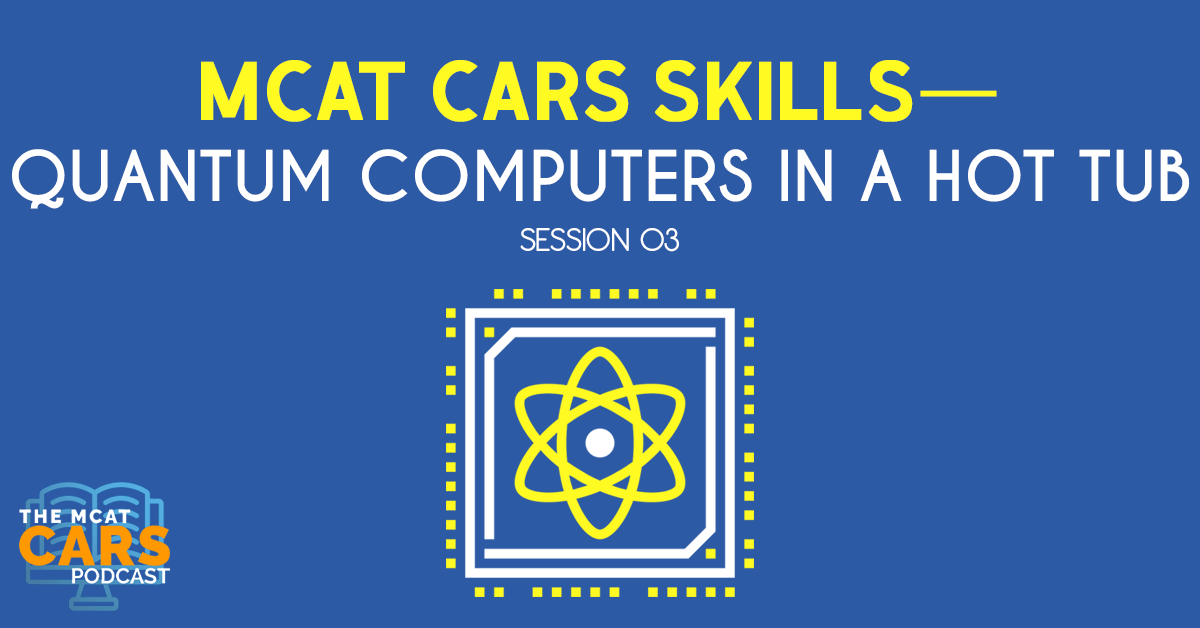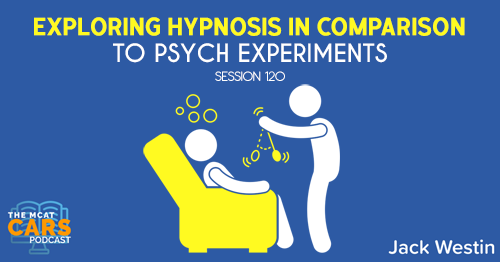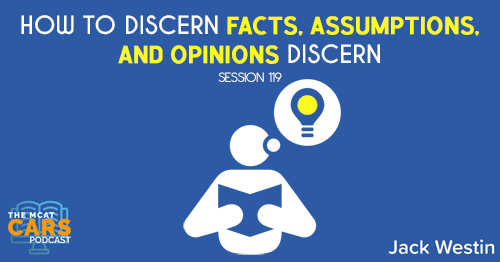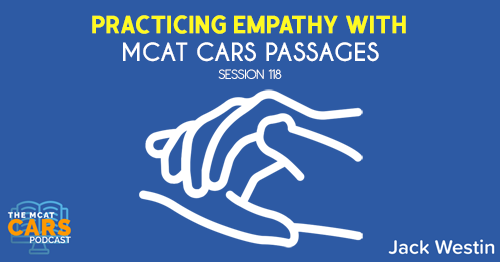Apple Podcasts | Google Podcasts

Session 03
This week we break down another great article, this time from Gizmodo, about quantum computers. Read along in the show notes to improve your MCAT CARS score.
Link to the full article: https://gizmodo.com/how-quantum-memory-could-change-computing–1829150822
In a hot tub in 2012, physicist Seth Lloyd pitched a quantum internet application to Google’s Sergey Brin and Larry Page. He called it Quoogle: a search engine that, using mathematics based on the physics of subatomic particles, returns results without ever actually knowing the query. Such an advance would require an entirely new kind of memory, called qRAM, or quantum random access memory.
Though intrigued, Brin and Page turned the idea down, Lloyd told Gizmodo. According to his story, they reminded him that their business model was based on knowing everything about everyone.
But qRAM as an idea hasn’t died. Today’s computers are quite good at remembering data represented by billions of bits, binary code digits that can equal either zero or one. RAM, or random access memory, stores the data short-term on silicon chips, assigning each piece of data a unique address that can be accessed randomly—in any order—to refer to the data later. It makes computer processes much faster, allowing your laptop or phone to quickly access the RAM for data frequently used by programs, rather than the storage, which is much much slower. But one day in the future, computer processors might be supplanted or augmented by quantum computer processors, machines that would be good at searching through huge datasets, machine learning, and artificial intelligence applications. Quantum computers are still a nascent technology, but if they’re ever going to be able to run these potentially lucrative algorithms, they’ll need to access RAM in a whole new way. They’ll require qRAM.
“[QRAM] would be an amazing application, and make the kind of quantum devices that Google and IBM make today instantaneously useful,” Lloyd told Gizmodo.
Classical computers, like ThinkPads, iPhones, and the best high-performance supercomputers, perform all their operations by translating data into one or many combinations of bit values, zeroes and ones. The bits interact, then the final result is another combination of ones and zeroes. Quantum computers also spit out a final result of ones and zeroes. But while the calculation is occurring, their quantum bits, or qubits, communicate with one another in a new way, through the same rules of physics that govern electrons. Rather than just equaling one or zero, a single qubit could be a little bit of both during the calculation, as governed by a special mathematical equation that encodes the probability you’ll get a zero or a one when you actually measure the qubit’s value. Multiple qubits have more complex equations that treat combinations of qubit values as single mathematical objects. The end result is one or several possible binary strings, with the final value given to the user determined by the probabilities encoded in the equations.
This week, we break down another great article, this time from Gizmodo, about quantum computers. We are once again joined by Jack Westin as he helps us break down each sentence.
[01:18] Should You Read the Title?
Jack doesn’t recommend reading the title before you get into it since it could actually distract you. At the bottom of every passage on the actual test, they give you the title and source. In some cases, it can help you. But generally speaking, Jack recommends that you don’t look at it unless you’re completely lost.
The reason for this is that they could pull out 6-7 paragraphs from any part of the book. And this may not have anything to do with the actual title. So don’t make this a habit. It may just end up wasting your time and it may lead to a distraction from the actual piece.
This week, we have an article from Gizmodo.
In a hot tub in 2012, physicist Seth Lloyd pitched a quantum internet application to Google’s Sergey Brin and Larry Page. He called it Quoogle: a search engine that, using mathematics based on the physics of subatomic particles, returns results without ever actually knowing the query. Such an advance would require an entirely new kind of memory, called qRAM, or quantum random access memory.
Though intrigued, Brin and Page turned the idea down, Lloyd told Gizmodo. According to his story, they reminded him that their business model was based on knowing everything about everyone.
But qRAM as an idea hasn’t died. Today’s computers are quite good at remembering data represented by billions of bits, binary code digits that can equal either zero or one. RAM, or random access memory, stores the data short-term on silicon chips, assigning each piece of data a unique address that can be accessed randomly—in any order—to refer to the data later. It makes computer processes much faster, allowing your laptop or phone to quickly access the RAM for data frequently used by programs, rather than the storage, which is much much slower. But one day in the future, computer processors might be supplanted or augmented by quantum computer processors, machines that would be good at searching through huge datasets, machine learning, and artificial intelligence applications. Quantum computers are still a nascent technology, but if they’re ever going to be able to run these potentially lucrative algorithms, they’ll need to access RAM in a whole new way. They’ll require qRAM.
“[QRAM] would be an amazing application, and make the kind of quantum devices that Google and IBM make today instantaneously useful,” Lloyd told Gizmodo.
Classical computers, like ThinkPads, iPhones, and the best high-performance supercomputers, perform all their operations by translating data into one or many combinations of bit values, zeroes and ones. The bits interact, then the final result is another combination of ones and zeroes. Quantum computers also spit out a final result of ones and zeroes. But while the calculation is occurring, their quantum bits, or qubits, communicate with one another in a new way, through the same rules of physics that govern electrons. Rather than just equaling one or zero, a single qubit could be a little bit of both during the calculation, as governed by a special mathematical equation that encodes the probability you’ll get a zero or a one when you actually measure the qubit’s value. Multiple qubits have more complex equations that treat combinations of qubit values as single mathematical objects. The end result is one or several possible binary strings, with the final value given to the user determined by the probabilities encoded in the equations.
[03:37] Paragraph 1, Sentence #1:
In a hot tub in 2012, physicist Seth Lloyd pitched a quantum internet application to Google’s Sergey Brin and Larry Page.
Jack says:
Imagine a hot tub in a hotel or a mansion. So there’s this guy Seth. Try to picture him out – someone from high school or whatever. It doesn’t matter. As long as you put a face to the name, this will help you keep track of the name a lot better.
Quantum is related to physics. Internet application, just think something on the internet. And they mention Google, and so maybe Sergey and Larry work at Google or they’re a part of Google. (They’re actually the founders of Google.) Pitch, in this case, means telling someone about something to see if you like it or you want to be a part of it.
Note: Don’t feel like you have to know everything! You may not know what those mean but as long as you realize there’s some kind of action happening here, then you’re fine.
[07:57] Paragraph 1, Sentence #2:
He called it Quoogle: a search engine that, using mathematics based on the physics of subatomic particles, returns results without ever actually knowing the query.
Jack says:
We know Google search for things. But Quoogle is math-related. This can be confusing for students. But then again, you don’t need to know what it means. Just realize there’s some search engine that uses some new algorithm. And they’re educating you here. They’re telling you quantum internet is really mathematics based on physics.
And realize that when you talk about search engines, you realize what happens the moment you click Enter. But what makes Quoogle different from Google is that it’s returning results without knowing what the question is. This seems weird and very futuristic.
[11:28] Paragraph 1, Sentence #3:
Such an advance would require an entirely new kind of memory, called qRAM, or quantum random access memory.
Jack says:
You don’t need to know exactly what this quantum internet application is. All you need is to realize it needs qRAM.
[12:21] Paragraph 2, Sentence #1-2:
Though intrigued, Brin and Page turned the idea down, Lloyd told Gizmodo. According to his story, they reminded him that their business model was based on knowing everything about everyone.
Jack says:
A lot going on here. Without saying directly that if you don’t ask questions, you’re not going to have that knowledge. Google wants to know everything about everyone. But it seems this Quoogle idea doesn’t go with that.
[13:55] Paragraph 3, Sentence #1-2:
But qRAM as an idea hasn’t died. Today’s computers are quite good at remembering data represented by billions of bits, binary code digits that can equal either zero or one.
Jack says:
Again, you don’t need to know about qRAM or RAM. This is the part where a lot of students are becoming detectives. They feel like they know what’s going on. But don’t pretend. If you don’t know what’s going on, that’s okay! Just continue reading and try your best to understand it. But don’t confuse yourself trying to puzzle things together. This is not necessary.
Don’t try to trick yourself thinking you see where this is going. Just read it for what it is. At the end of the passage, you can say you see where it’s going. But not as you’re reading – this is a false sense of security and this could deviate you from what is actually being discussed. Why? Because you may bring in your own bias in what you understand and it may be inconsistent with what the author is saying.
[16:11] Paragraph 3, Sentence #3:
RAM, or random access memory, stores the data short-term on silicon chips, assigning each piece of data a unique address that can be accessed randomly—in any order—to refer to the data later.
Jack says:
Now, it’s trying to teach you what RAM is.
[16:44] Paragraph 3, Sentence #4:
It makes computer processes much faster, allowing your laptop or phone to quickly access the RAM for data frequently used by programs, rather than the storage, which is much much slower.
Jack says:
The MCAT doesn’t ask specific questions about the difference between RAM and storage. But knowing that distinction can help you solve problems. They may throw in random questions that mention storage or RAM. However, they’re probably not going to confuse you with RAM and storage. This is just good to know, which is general background knowledge.
[18:22] Paragraph 3, Sentence #5:
But one day in the future, computer processors might be supplanted or augmented by quantum computer processors, machines that would be good at searching through `.
Jack says:
So here, maybe “quantum computer processors” is another way of presenting qRAM. Remember, we can use different words to express the same thing. Just like in last week’s passage, remember how they mentioned sugar and glucose until they just used the word glucose to represent sugar. It’s the same thing here. Quantum computer processors are probably related to qRAM.
Supplanted or augmented – they said “or” here so they may just mean the same thing or roughly the same thing. Now, look at the words – huge datasets, machine learning, and artificial intelligence applications. Those things may need more qRAM because they may need to do more work, to be able to do things faster, in a sea of data.
Hence, this sentence is literally teaching you that machine learning and artificial intelligence have huge datasets and they may need quantum stuff.
[21:45] Paragraph 3, Sentence #6-7:
Quantum computers are still a nascent technology, but if they’re ever going to be able to run these potentially lucrative algorithms, they’ll need to access RAM in a whole new way. They’ll require qRAM.
Jack says:
You don’t need to know what “nascent” means. They say, if they’re ever able to run these, so are they currently running them? No. Hence, nascent probably means it’s new or novel, something rudimentary. It’s something to do with how it’s not being used.
[23:15] What the Paragraph Means:
qRAM is needed for the future of our computing needs.
[23:27] Paragraph 4, Sentence #1:
“[QRAM] would be an amazing application, and make the kind of quantum devices that Google and IBM make today instantaneously useful,” Lloyd told Gizmodo.
Jack says:
This is the same as the previous paragraph, only that they’re bringing in Lloyd here again.
[24:28] Paragraph 5, Sentence #1-2:
Classical computers, like ThinkPads, iPhones, and the best high-performance supercomputers, perform all their operations by translating data into one or many combinations of bit values, zeroes and ones. The bits interact, then the final result is another combination of ones and zeroes.
Jack says:
So you simply imagine those gadgets mentioned here. It’s educating here again as to how they’re translating data into zeroes and ones.
[25:46] Paragraph 5, Sentence #3:
Quantum computers also spit out a final result of ones and zeroes.
Jack says:
Now, they’re making a comparison between quantum computers and iPhones in that they work the same way with zeroes and ones.
[26:03] Paragraph 5, Sentence #4:
But while the calculation is occurring, their quantum bits, or qubits, communicate with one another in a new way, through the same rules of physics that govern electrons.
Jack says:
They explain that while their results may be similar, what’s happening during it is much more different as there’s this physics stuff going on – interaction, communication. Notice how they’re using “or” again – quantum bits of qubits.
[26:45] Paragraph 5, Sentence #5:
Rather than just equaling one or zero, a single qubit could be a little bit of both during the calculation, as governed by a special mathematical equation that encodes the probability you’ll get a zero or a one when you actually measure the qubit’s value.
Jack says:
Here, they’re explaining how these are communicating. Just realize that it’s not necessarily zero or one. It may be a combination. Qubits may be a mixture while the others may not be, just one or zero.
[27:46] Paragraph 5, Sentence #6:
Multiple qubits have more complex equations that treat combinations of qubit values as single mathematical objects.
Jack says:
This is a tough sentence. But you’ve read so much now. The key here is not to panic. Try your best but if you don’t get this sentence, then just move on.
[29:38] Paragraph 5, Sentence #7:
The end result is one or several possible binary strings, with the final value given to the user determined by the probabilities encoded in the equations.
Jack says:
This sounds like more of a Physical passage where they bring in stuff you’re not familiar with. And CARS can sound like the other sections or vice versa. This is a good example of what they would include in a Physical passage that sounds similar to some concepts you’ve already studied. Here, they’re kind of referring to orbitals, a probability that an electron exists within a region. But they don’t call it that here. In fact, you might even get questions on orbitals on the Physical section with respect to this passage. So this could be a Physical passage or a CARS passage. They throw in a lot of things you may not know but if you read it, you should be able to understand it.
This is a good example of a boring passage but could really be on your test. So try to run your reading range. Try to read a lot of different types of articles and passages. This could fall under those topics you may not like so keep practicing it!
[31:48] Seek Out Jack Westin for More Help!
If you’re looking to increase your score on the MCAT CARS, check out Jack Westin and their MCAT CARS strategy course where you get over 70 hours of instruction, an interactive online classroom, personalized attention with constant feedback, and much more! Good news, you can do these in 10 weekly installments.
Links:
Full article: How Quantum Memory Could Change Computing
SEARCH SITE
SEARCH SITE
LISTEN FOR FREE











